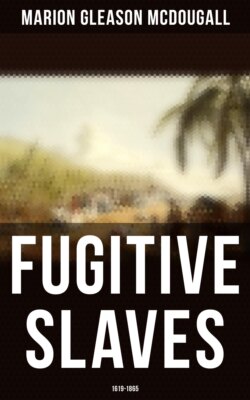Читать книгу Fugitive Slaves (1619-1865) - Marion Gleason McDougall - Страница 5
На сайте Литреса книга снята с продажи.
Escapes in New England.
Оглавление§ 5. Escapes in New England: Attucks case.—Although we do not find records of fugitive slave cases tried at this time within the New England colonies, advertisements of runaways exist in sufficient numbers to prove that escapes were common. It seems probable, therefore, that the return of a slave when within his own colony was taken as a matter of course, and roused so little opposition, and required so simple a process at law, that matters concerning it would seldom find mention in the chronicles of the time. Here is a typical advertisement:—
"Ran away from Samuel Gilbert of Littleton, an indentured Servant Boy, named Samuel Gilson, about 17 years old, of a middling Stature for his Age, and wears black curled Hair, he carried away with him a blue cloth Coat, a light colored Jacket with sleeves, one pair of worsted Stockings, two striped woolen Shirts, and one good linnen Shirt. He went away in company with a short thick set Fellow, who wore a green coat and a green Jacket double breasted, also a pair Indian green Stockings. Whoever shall take up and secure, or give information of said runaway, so that his master may find him again, shall receive a Reward of two dollars and all necessary charges from
Samuel Gilbert.
"All masters of vessels and others are cautioned against harboring," etc.16
Again a case interesting not only as an illustration of the customs of the time, but also because the fugitive himself bears a name known to history in another connection, is noticed in the Boston Gazette of 1750. Here is advertised as escaping, October 2, 1750, from his master, William Browne of Framingham, Massachusetts, "A molatto fellow about twenty-seven years of age, named Crispus." After describing his clothing and appearance, a reward of ten pounds, old tenor, is offered for his return, and "all masters of vessels and others are cautioned against concealing said servant on penalty of law."17 Tradition has it, however, that he was never arrested, but returned of his own accord after a short time, and was for the next twenty years a faithful servant.18 Then, in 1770, presumably while in town upon one of the expeditions he often undertook to buy and sell cattle for his master, he was drawn into the Boston Massacre of March 5.19
A somewhat famous case, which also occurred in Massachusetts, though many years later, may here be mentioned. About 1769 one Rotch, a Quaker, and therefore probably opposed to slavery, received on board the whaler Friendship a young negro boy named Boston, belonging to the heirs of William Swain. At the end of the voyage his master, John Swain, brought action in the court of Nantucket against Captain Folger for the recovery of the slave; the jury, whether from lack of evidence or from sympathy cannot be determined, returned a verdict in favor of the defendant.20
